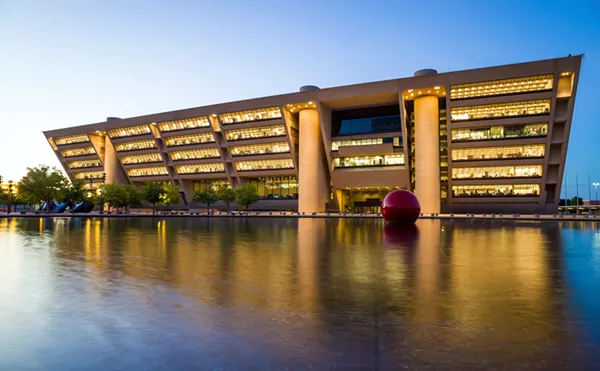The Madera Lakeside apartments in north Arlington have the cookie-cutter look of much of suburban North Texas, a series of low-rise buildings in various shades of beige with a name ("Lakeside!") that doesn't quite match reality (an oversized puddle). The road it sits on, Brown Boulevard, is curvy, narrow and fast. The sidewalks are empty. It takes a few drive-bys and U-turns to realize that there is no street parking in sight. The gated parking lot is packed with cars.
Brent Fleming moved to Madera Lakeside in May 2012. Not long after he did, he noticed something strange: On nights when he came home late, he'd see men inside the complex's gated lot, shining flashlights at parked cars. Then they'd call in the tow trucks. He remembers being struck by the careful way a tow truck loaded up an SUV before speeding away. "They pull out of there as if they were literally stealing a car," he says.
Not to worry, though: He had his parking sticker and had positioned it in the back window, just like the woman in the leasing office told him to. But then, three weeks after moving in, he walked to the lot to discover his car missing. He assumed it'd been stolen so he called the police. But the police somehow knew better: It's been towed, they said. Fleming, 21, made a few calls and learned that the car was in the possession of a Fort Worth towing company called Black Bull. It was a name that, like many apartment dwellers, Fleming would get to know well.
He missed work at Office Depot that day and got written up by his boss. A friend drove him the 15 miles to Black Bull lot in Fort Worth, where a voice behind the bulletproof glass asked him for $380. That bought him access to Black Bull's tow lot, where he walked past hundreds of cars before he came across his black Scion tC.
Fleming retrieved his car and drove back to his apartment, where a property manager explained why he got towed: The sticker should have been on the front window, not the back. Irate, Fleming asked why he should foot the bill for getting bad advice from the leasing office. What happened next was a strange, but welcome, development.
"Well, I can't really do anything, but I guess I can try and call Black Bull," the woman said, according to Fleming. "I'm good friends with them, so maybe he'll refund the money for you."
Miraculously, she did: A week later, Fleming got his $380 check in the mail. The office's "friendship" with the towing company struck him as odd, perhaps a red flag. But he didn't think much of it, not until the next time his car disappeared.
Dallas and its suburbs offer a never-ending selection of faux-luxury apartment buildings, complete with swimming pools, polished websites, fancy names and gated parking. Depending on the complex, those parking lots can be a major source of stress for both resident and property manager. And it can be a major source of revenue for towing companies, depending on the relationship they have with property managers.
"Towing has always been a problem, [with] managers just wanting to tow you out of vindictiveness," says Robert Doggett, an attorney at Rio Grande Legal Aid who often represents tenants.
Most apartment buildings have an arrangement with tow companies, to keep their lots free of illegally parked cars. For tow companies, it's big business. "We help free some more parking spaces, that's the whole point of it," says Cory Trip, who works for Black Bull Towing. "You don't want to go home and not have somewhere to park."
State law bars apartment complexes from profiting from the tows, which should discourage property managers from letting companies like Black Bull take cars away for petty reasons. "They can't receive any benefits whatsoever from the towing company, period," says Pat Johnson, a former tow truck driver in Travis County who runs a watchdog organization, Texas Towing Compliance, and a blog called Texas Parking Facility Fraud. (His website endorses exactly two towing companies.)
"Some property managers ... are weak when it comes to turning away a towing company salesman offering their services ..." Johnson writes on his blog, "all at a price they could not get from anyone else, free."
If a car is towed illegally, often the only resource is small-claims court. But while the initial hearing costs just $26, winning is a long shot and lawyers' fees can be hefty. Successful plaintiffs used to be guaranteed attorneys' fees, but that guarantee was nullified by state lawmakers in 2011. The legislation was co-sponsored by State Senator John Carona, who happens to own Texas' largest group of homeowners associations.
State law still bans towing companies from giving apartment complexes those all-important parking stickers, the very stickers that towing companies use to know which cars to tow. It's a sensible law. And it's one Black Bull appears to have found a way to flaunt.
Just off Interstate 30 in Mesquite is a massive fence that looks to guard a military fortress. A sign out in front lets you know what's actually hiding back there: Black Bull Towing. It's one of the company's several towing yards.
You get past the fence via intercom. After opening the first gate, a voice behind bulletproof glass has to buzz you in a second time. Signs warn that you're being recorded: "Watch what you say."
I'm here to meet with Cory Trip, a husky man dressed in a black button-down collared shirt. He's speaking to me not just on behalf of Black Bull Towing but also a company called Texas Association of Safer Apartment Communities. Dan DeWitt is here, too, representing TASAC.
TASAC provides member apartment complexes with a variety of services, but its main service is a monthly parking-sticker program, which the company claims to have invented. Each month, TASAC complexes provide residents with new parking stickers. If a resident is late on his rent, no sticker. Not until the rent comes in. Residents who don't have up-to-date stickers can look forward to meeting the folks from Black Bull Towing, described on a TASAC flier as "the parking management company we use."
Meanwhile, property managers who agree to join the program get an added bonus: free legal help from Huhem Law Firm, whose website advertises that it "was named the top apartment law firm in 2010 by the TASAC (Texas Association of Safe Apartment Communities)." That legal help includes free legal services when a resident needs to be evicted. "With our program, you'll never pay another penny for an eviction!"
According to TASAC, apartments pay to join, although neither DeWitt nor Trip will say how much. TASAC also insists that it's completely independent from Black Bull, even though they agreed to be interviewed together at a Black Bull towing yard. "That's why the association's named the Texas Association of Safer Apartment Complexes, that's TASAC broken down," says Trip, butchering the name of the group.
Trip says that in places where Black Bull appears to be overzealous, the company is actually just removing unwanted cars that people have purposely discarded inside apartment parking lots. "People just taking them there and basically dumping them, at any given time," Trip says. "You can pull lots and lots of cars out like that, and that's where it looks aggressive at that point. But in reality, that's what the management needs on the property."
Doggett, the tenant attorney, sees it differently. "Everybody understands that you should pay your rent, and if you don't then you should face eviction, but that's after due process," he says. "To tow your car and not be allowed to park at the facility, that's above and beyond, and I also think that policy would not stand judicial scrutiny."
TASAC has "hundreds" of apartment complex clients but decline to say which ones. "We don't give our secrets out," says Trip. TASAC used to have a website, but it's down because they're adding "some new projects that we can't really discuss," DeWitt says. They also can't say who owns TASAC. "I'm not sure, honestly," he says. After a beat: "I think Victor owns that." That is correct.
State records list the company's registered agent as the Huhem Law Firm, the same firm that offers free legal services to apartment complexes in exchange for letting TASAC dole out parking stickers and Black Bull troll parking lots. TASAC shares an address with Black Bull, and the Huhem firm is also the attorney for Black Bull. The law firm's founder, Victor Huhem, is the brother of Black Bull's owner, Aaron Huhem. So while Black Bull itself doesn't appear to give anything of benefit to landlords, property managers who sign up for TASAC get free eviction help from Black Bull's attorney, who happens to be his brother.
According to Tarrant County court records, Victor Huhem has a healthy legal business, representing Black Bull when it's being sued by angry tenants. He also represents property companies, independent of Black Bull. Recent clients include Park Place, Casa Villa Apartments and Madera Residential, the company that owns the apartments where Brent Fleming got his Scion towed. According to the TASAC flier, the Huhem Law Firm is the "top-rated apartment law firm in Texas!" Victor Huhem would later admit that he wrote that flier himself. "We handle more apartment-related cases than any other law firm, and my clients and I believe we're the best in the state," he says in an email in response to a list of questions.
His brother, Aaron, wasn't available to talk about Black Bull because he lives in Israel. Victor says that nonetheless, Aaron runs Black Bull via Skype and telephone.
"I do not make any profits off of Black Bull towing other than legal fees," Victor writes. "My only involvement with Black Bull is to give legal counsel and representation and, of course, my dealings with it as a TASAC vendor."
Whatever Black Bull does to win over landlords, it's working. The company claims to be the biggest private-property towing company in DFW, and records show that it's often taken to court by disgruntled residents.
Joey Kinser was living at the Park Place apartments in Fort Worth and had parked his trailer in the apartment for a year without issue, he says. But the apartment complex changed its policy on allowing trailers in 2011 without telling him. When he came back from a week-long trip, the trailer was gone.
Black Bull charged him $700 for the tow and the storage fees, but he didn't have the money. Instead, he paid for a tow hearing, but the judge sided with Black Bull. "I couldn't get it back and I guess they sold it at an auction or something," he says. "It's like stealing from me, is what I think."
There is no street parking at the Club at Spring Lake, a modest apartment complex in Haltom City surrounded by lush greenery. On a recent weekday, Black Bull Towing signs were plastered over the gate to the entrance, which was left wide open.
"A lot of people moved out of these apartments because of the towing," says Beverly Anderson. Under her lease, she received a yearlong parking pass. But for visitors, she needs to get a new pass every 30 days. Her boyfriend once used a visitor's pass that had been expired for just one day. His car got towed.
She sees the tow trucks every night. One night, a driver trying to tow was surrounded by a group of men. One of the men ripped a sticker off a parked car and put it on the towed car. She says witnesses began chanting, "kick the guy's butt." Eventually, a cop came and suggested that the driver drop the car.
"They're real sneaky," says Summer Dunn, another tenant. She sees the drivers at least twice a week, though she's never gotten towed herself. "They do it as fast as they can."
Tun Phan's ex-wife got towed, he says, when she visited him after the leasing office was closed. He couldn't get a visitor's pass. He didn't think he needed to worry. "It costs too much money," he says of the $300 towing fee.
Daniel Chamberlain was at the complex one night when he noticed that someone in their group of friends was getting his car towed. It didn't have a visitor's pass. His friend sprung into action, ran in the back of the tow truck, turned on his car and attempted to drive it off. "We definitely see tow trucks cruising through here all the time," Chamberlain says.
Meanwhile, back at Madera Lakeside, Brent Fleming managed to make it another three months before his car got towed again. He paid $380 again. But this time, he took pictures of his car in the towing lot, with the sticker on the front window. Then he paid $26 for a tow hearing and $800 for a lawyer.
But Black Bull had its own pictures, he says. They presented pictures zoomed in on the front of the car, at a perspective with the hood covering a portion of the front window, just the spot where the parking sticker would be. "They just made four different copies of the same picture and said, 'See both times you don't have the sticker,'" Fleming says. A judge dismissed the case.
Now out for more than $1,000, Fleming confronted Shannon Kiowski, the same property manager from his first go-around. "I told them, 'If you ever tow my car again I will take you to court again,' and they were like, 'Well if you would just keep your sticker in your car then we wouldn't have to tow it.'"
"My sticker's been in my car both times," he recalls saying. "I live here. You obviously know that."
Approached in the leasing office, Kiowski declined to comment. But Fleming's done there anyway: He moved out in May when his lease ran out, and found a place in a complex not far away, where the management promises to warn tenants in writing before their cars get towed.












